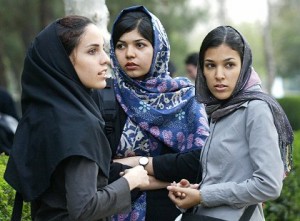 Morality police adopt a more root-and-branch�approach in battle against females who show too much hair or makeup
Morality police adopt a more root-and-branch�approach in battle against females who show too much hair or makeupWith spring coming and temperatures rising, Iranians can expect the time-honoured�crackdown on "inappropriately dressed women". Like every year,�Iran's morality police will bundle women who show too much hair or wear too much makeup into minivans, exposing them to a few hours of boredom at the local police station. For a country with the second highest spending on makeup per capita in the world, the process is the Iranian version of shovelling snow while it's still snowing.
Perhaps this is why this year they have decided to take a more root-and-branch approach: teaching hijab and chastity to toddlers.
Although�Islam�doesn't call for girls to be veiled until they are nine, the governor of Tehran, Morteza Tamadon, recently stressed the importance of "popularising" chastity and hijab among Iranians. He recommended "starting in kindergartens before reaching those in higher education".
"We cannot expect to see hijab and chastity exist in society without proper cultural work," he said. "Our goal in the social transformation plan devised by the government is institutionalising chastity and hijab as a natural [demand] in society."
It seems these recommendations are being heeded. The welfare office of Qom is training 400 experts on hijab and chastity who will be sent to kindergartens across the city.
The 1,530 kindergartens under the jurisdiction of the north-eastern Khorasan Razavi province, whose capital is Iran's second city Mashhad, reportedly held "chastity and hijab exhibitions" during the mourning months of Muharram and Safar (mid-November to mid-January). A welfare officer in the province said it was important to make the distinction between educating children and adults about dressing modestly.
"Research has found that indirect methods have more effect on kids," said Tahereh Bakhtiyari. "Using art expression is one of these methods."
But maintaining demand for the hijab is a cradle-to-the-grave pursuit.
This month the director of the Tahoura Institute, Hojatoleslam Mehdi Bayati, told a local news wire that the institute was developing a masters' course in chastity, shame and modesty.
He said the programme would benefit educational groups as well as the�Basij, Iran's volunteer militia, whose members fill the ranks of the morality police and the Revolutionary Guards.
The outgoing president,�Mahmoud Ahmadinejad, has been criticised throughout his eight years in office for being lax on the enforcement of the Islamic Republic's strict dress codes. In 2010 he caused a storm among Iran's "principlists" � those faithful to the original values of the revolution � when he said that government had "no role" in the fight against "bad hijab".
With presidential elections coming up this summer there is talk of Ahmadinejad grooming a successor to run against a principlist. If he pulls it off, the issue of hijab and chastity could become a political football.
"It's just a game," said a 30-year-old woman from Tehran who was picked up on the streets by police last spring coming home from work. "There were 50 girls rolling their eyes at the police and texting on their phones."
"One of their mothers arrived and made a big show, calling her daughter bad names in front of the police. She caused such a scene the police threw her in a cell."
By The Guardian
The Iran Project is not responsible for the content of quoted articles.










